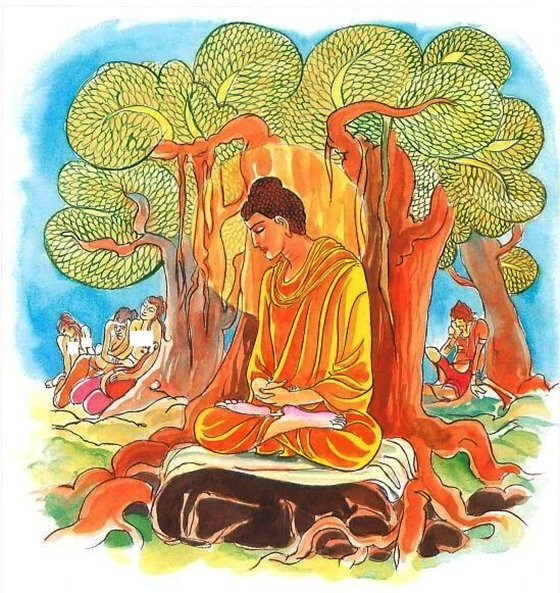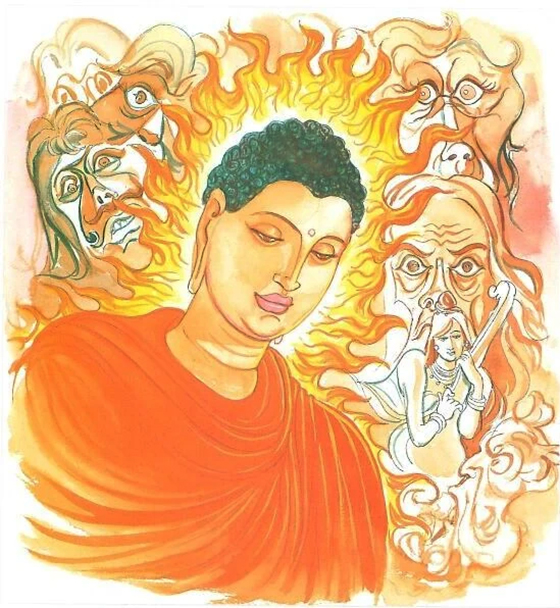Verse 179: The Buddha, whose conquest (of moral defilements) is complete, in whom there cannot arise any further defilements in this world, that Buddha of infinite range of wisdom, who is trackless, – by what track will you lead him?
Verse 180: The Buddha, in whom there is no craving, which like a net would bring him back to any existence (in samsara), that Buddha of infinite range of wisdom, who is trackless, – by what track will you lead him?
- jitam navajiyati: ‘the conquest is complete’ means there is no need for further conquests as there are no more moral defilements to be conquered.
-
jitam yassa no’yati koci loke: lit., whose conquered defilements cannot be followed by any further defilements in this world.
-
anantagocaram: The range of wisdom of the Buddha is infinite by reason of his omniscience, Sabbannuta nana. (The Commentary)
-
apadam: lit., ‘trackless’. The Buddha, being free from conditions of rebirth, such as craving, clinging, passion, etc., his track or passage through samsara has come to an end. (The Com.)
[The same idea is conveyed in verses 92 and 93 which express the idea that the arahat passes away, leaving no more trace of existence than a bird leaves its passage through the air.]
- kena padena nessatha: lit., by what track will you lead him? It means he cannot be lured by any temptation whatsoever.
The Story of the Three Daughters of Mara
The Buddha first uttered Verses (179) and (180) of this book while residing near the Bodhi tree, with reference to the three daughters of Mara. He repeated these verses to the brahmin Magandiya while journeying through the Kuru country.
Magandiya the Brahmin and his wife lived in the kingdom of the Kurus with their daughter Magandiya who was exceedingly beautiful. She was so beautiful that her father rudely turned down all her suitors. One day, early in the morning, when the Buddha surveyed the world, he found that time was ripe for the brahmin Magandiya and his wife to attain Anagami Fruition. So, taking his bowl and the robes, the Buddha set out for the place where the brahmin usually went to offer fire sacrifice.
The brahmin, seeing the Buddha, promptly decided that the Buddha was the very person who was worthy of his daughter. He pleaded with the Buddha to wait there and hurriedly went off to fetch his wife and daughter. The Buddha left his footprint and went to another place, close at hand. When the brahmin and his family came, they found only the footprint. Seeing the footprint, the wife of the brahmin remarked that it was the footprint of one who was free from sensual desires. Then, the brahmin saw the Buddha and he offered his daughter in marriage to him.
The Buddha did not accept nor did he refuse the offer, but first, he related to the brahmin how the daughters of Mara tempted him soon after his attainment of Buddhahood. To the beautiful Tanha, Arati and Raga, the daughters of Mara, the Buddha had said, “It is no use tempting one who is free from craving, clinging and passion, for he cannot be lured by any temptation whatsoever.”
Then the Buddha spoke in verse as follows:
Verse 179: The Buddha, whose conquest (of moral defilements) is complete, in whom there cannot arise any further defilements in this world, that Buddha of infinite range of wisdom, who is trackless, – by what track will you lead him?
Verse 180: The Buddha, in whom there is no craving, which like a net would bring him back to any existence (in samsara), that Buddha of infinite range of wisdom, who is trackless, – by what track will you lead him?
Then, the Buddha continued, “Brahmin Magandiya, even when I saw those peerless daughters of Mara, I felt no sensual desire in me. After all, what is this body of your daughter? It is full of urine and filth; I don’t like to touch it even with my foot!” On hearing those words of the Buddha, both the brahmin and his wife attained Anagami Fruition. Later, they joined the Order and eventually both of them attained arahatship.
Dhammapada Verses 179 and 180
Maradhitara Vatthu
Yassa jitam navajiyati1
jitam yassa no’yati koci loke2
tam buddhamanantagocaram3
apadam4 kena padena nessatha.
Yassa jalini visattika
tanha natthi kuhinci netave
tam buddhamanantagocaram
apadam kena padena nessatha5.
Source: Tipitaka









Add a comment